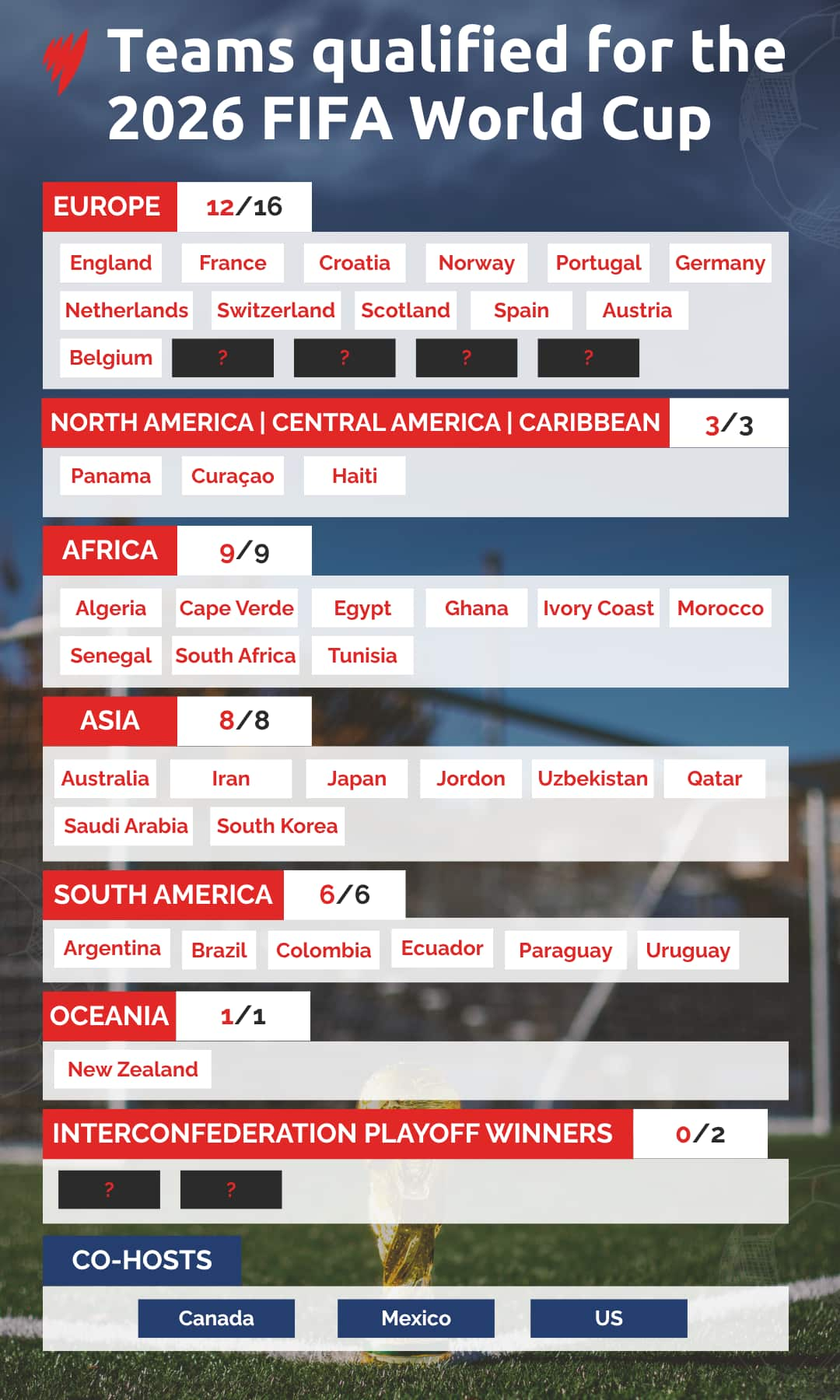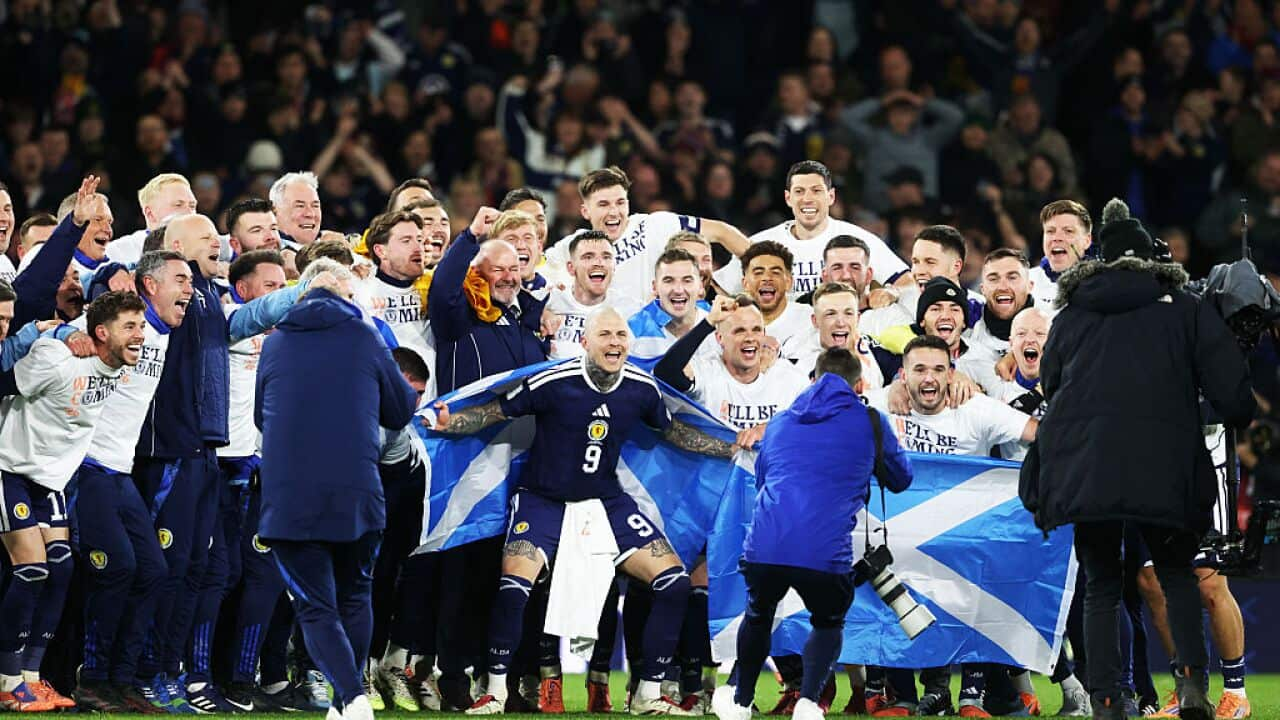A bicycle-kick goal, last-minute thrillers, historical breakthroughs, smiles and tears — the latest FIFA World Cup 2026 qualifiers delivered the full range of emotions, with several national teams securing their tickets to next year's showpiece event.
As November qualifying matches wrap up, 14 additional teams have secured their places at the tournament, bringing the total number of qualified teams to 42.
Next year's men's World Cup has expanded from 32 teams to 48 teams for the first time. The remaining six qualifying teams will be decided through play-off matches in March.
The qualifiers started worldwide in October 2023, with Japan the first team to qualify.
The 42 qualified nations, including Australia, will find out who their opponents will be at the World Cup 2026 final draw in Washington DC on Saturday 6 December (AEDT).
You can watch it live on SBS and SBS On Demand from 4am AEDT.
Here is what you need to know about the teams that have qualified for the World Cup, and those who still have a chance.
Which new teams have qualified for the 2026 FIFA World Cup?
Let's start with the most surprising name: Curaçao.
The small Caribbean nation, with a population of 156,000 and an area of 444 sq km, has made history as the smallest country to qualify for the World Cup following a 0-0 draw against Jamaica in Kingston on Wednesday (AEDT).
Alongside Curaçao, Panama, and Haiti are the other teams that qualified from the Confederation of North, Central America and Caribbean Association Football in the recent qualifying fixtures.
During the fixtures, 11 European teams, including Austria, Belgium, Croatia, France, Germany, the Netherlands, Norway, Portugal, Scotland, Spain, and Switzerland, secured their tickets to North America.

They are joining England, the only other European team who qualified before the matches between 14 November and 19 November.
One of the most iconic moments of the UEFA qualifiers occurred when Scotland beat Denmark 4-2 on Wednesday morning (AEDT), qualifying for the World Cup for the first time since 1998. The highlights of the match were a spectacular bicycle kick goal by star midfielder Scott McTominay and a strike from halfway by Kenny McLean to seal the win.
Striker Lyndon Dykes, who grew up on Queensland's Gold Coast, was also playing for Scotland, and he is likely to be at the World Cup.
Norway and Austria are the other teams we will see at the tournament for the first time in 28 years.
Norway beat Italy 4-1, thanks to two goals from their renowned striker, Erling Haaland, who plays for Manchester City in the English Premier League.
Austria secured their place with a 1-1 draw against Bosnia and Herzegovina.
Which teams can still qualify for the 2026 FIFA World Cup?
This is not the end of the World Cup qualifier thrillers, with the final six places at the tournament to be decided in March.
Sixteen teams from Europe will play off for four places and six teams from the rest of the world will play off for two places.
Twelve of the European teams finished runner-up in their group and the remaining four teams finished third in their qualifying group but made the playoffs because they were among the four best-ranked UEFA Nations League group winners.
The 16 teams in the European play-offs are: Albania, Bosnia and Herzegovina, Czechia, Denmark, Italy, Kosovo, Poland, the Republic of Ireland, Slovakia, Türkiye, Ukraine, Wales, Romania, Sweden, Northern Ireland, and North Macedonia.
Two other qualifiers come from the winners of an Interconfederation playoff, which will be played between the Democratic Republic of Congo, Jamaica, Suriname, New Caledonia, Bolivia and Iraq — coached by Australian Graham Arnold.
Which big names won't be at the World Cup?
While teams such as Curaçao, Uzbekistan, and Cape Verde are making their World Cup debuts, and others are reappearing after several years, some big football names are going to miss the tournament.
Serbia, Greece, and Hungary are the best-known European teams that have not qualified for next year's World Cup.
Four-time World Cup winners Italy will have to qualify through the play-offs and are in danger of missing the tournament for the third time in a row, after failing to make Qatar 2022 and Russia 2018.
Chile, a two-time Copa America winner, has also failed to qualify for the tournament.
African giants Nigeria and Cameroon, who have qualified for the World Cup six and seven times, respectively, will also not feature in the tournament.
For the latest from SBS News, download our app and subscribe to our newsletter.

